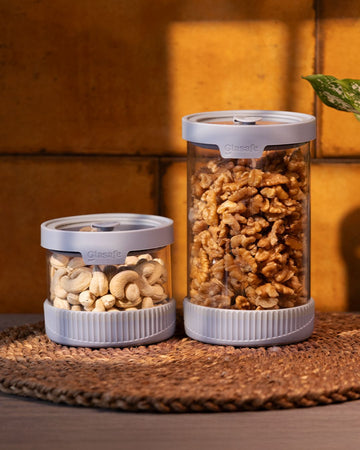In recent years, borosilicate glass has gained popularity as a safe and eco-friendly alternative to plastic and other materials for food storage. With growing concerns about the health risks associated with plastic containers, many people are turning to glass for storing food in the refrigerator. But is borosilicate glass truly safe for fridge use? What makes it different from regular glass? And how does it compare to other materials like plastic and stainless steel?
In this detailed blog, we’ll explore everything you need about borosilicate glass, its safety, benefits, and practical tips for using it in the fridge. We’ll also address common questions and concerns in the end.
What is Borosilicate Glass?
Borosilicate glass is a type of glass composed of silica and boron trioxide. This unique composition gives it exceptional thermal and chemical properties, making it highly resistant to thermal shock, chemicals, and physical damage. Unlike regular soda-lime glass, borosilicate glass can withstand extreme temperature changes without cracking or breaking, so it’s widely used in laboratories, cookware, and food storage containers.
Key Properties of Borosilicate Glass:
-
Thermal Shock Resistance: Can handle rapid temperature changes, such as moving from the refrigerator to the microwave.
-
Non-Toxic and Non-Reactive: Does not leach chemicals or interact with food, even acidic or oily foods.
-
Durability: Stronger and less prone to breaking compared to regular glass, including soda-lime glass.
-
Transparency: Borosilicate glass has crystal-clear visibility, which allows you to easily see the contents inside the container.
-
Eco-Friendly: Borosilicate glass is recyclable and reusable, making it a sustainable choice for everyday use.
Using Borosilicate Glass in the Fridge
Storing food in the refrigerator requires a material that is safe, non-reactive, and easy to clean. Glasafe’s borosilicate glass products check all these boxes, making it an excellent choice for fridge storage. Here’s why:
-
Non-Toxic: Unlike plastic, borosilicate glass does not contain harmful chemicals like BPA or phthalates, which can leach into food, especially when exposed to temperature changes or acidic foods.
-
Odor and Stain Resistance: Glass does not absorb odors or stains, ensuring that your containers remain fresh and clean over time.
-
Transparency: The clear nature of borosilicate glass allows you to easily identify the contents of your fridge, making meal planning and organization a breeze.
-
Easy to Clean: Borosilicate glass is dishwasher-safe and does not retain residues, making it a low-maintenance option for busy households.
Tips for Using Borosilicate Glass in the Fridge:
-
Avoid Sudden Temperature Changes: While borosilicate glass is resistant to thermal shock, it’s still a good practice to avoid transferring hot glass containers directly into the fridge. Allow them to cool to room temperature first.
-
Use Airtight Lids: Ensure your containers have tight-fitting, airtight lids to keep food fresh and prevent spills. For airtight and spill-proof containers, tiffins, or water bottles, check our Glasafe range of premium quality borosilicate glassware online, available across India.
-
Stack Carefully: Although borosilicate glass products are super durable and sturdy, it’s best to stack containers, tiffins, or glasses carefully to avoid accidental breakage. Plus, you can find break-resistant glassware with a stylish and tough silicone cover from Glasafe.
Is Borosilicate Glass Safe for the Fridge?
Freezing food requires containers that can withstand extreme temperatures without cracking or breaking. Glasafe’s borosilicate glass products are specifically designed to handle such conditions, making it a safe and reliable option for fridge storage. Here’s why it’s a great choice:
-
Thermal Shock Resistance: Borosilicate glass can endure the extreme temperature changes that occur when moving containers from the fridge to the microwave or oven.
-
Non-Reactive: It does not interact with food, ensuring your frozen meals remain safe and free from any contamination.
-
Durability: Borosilicate glass is less likely to break or crack in the fridge compared to regular glass, making it a more reliable option for long-term storage.
-
Versatility: Glasafe’s glassware can be used in the refrigerator, microwave, oven, and dishwasher (top rack only), making them a versatile addition to your kitchen.
Tips for Using Borosilicate Glass in the Fridge:
-
Leave Room for Expansion: When freezing liquids, leave some space at the top of the container to allow for expansion as the liquid cools. This prevents the container from cracking.
-
Avoid Extreme Temperature Changes: While borosilicate glass is resistant to thermal shock, it’s still advisable to avoid placing hot glass containers directly into a cold environment. Allow them to cool to room temperature first.
-
Use Fridge-Safe Lids: Ensure that the lids of your borosilicate glass containers are refrigerator-safe and provide an airtight seal to prevent cold burn.
-
Label and Date: Always label and date your frozen foods to keep track of storage times and ensure that you use them before they lose their quality.
Borosilicate Glass vs. Regular Glass
Regular soda-lime glass is more prone to thermal shock and can crack or break when exposed to sudden temperature changes. While, borosilicate glass is specifically designed to withstand such conditions, making it a safer and more durable option for fridge storage.
Borosilicate Glass vs. Plastic
Plastic containers are lightweight and convenient, but they come with several drawbacks. They can leach harmful chemicals into food, especially when exposed to heat or acidic foods. Additionally, plastic containers can absorb odors and stains, making them less hygienic over time. Borosilicate glass, being non-reactive and easy to clean, offers a safer and more sustainable alternative.
Borosilicate Glass vs. Stainless Steel
Stainless steel containers are durable and non-reactive but they are clunky and also not transparent, making it difficult to see the contents. Borosilicate glass offers the advantage of being modern and allows transparency, so you can easily identify the contents of the container. Additionally, our borosilicate glass can be used in the microwave, whereas stainless steel cannot.
Environmental Impact of Borosilicate Glass
In addition to its safety and durability, borosilicate glass is also an environmentally friendly option. Unlike single-use plastics, which contribute to environmental pollution and take hundreds of years to decompose, borosilicate glass is recyclable and can be reused indefinitely without losing its quality. By choosing borosilicate glassware, you are making a sustainable choice that benefits both your health and the environment.
End Note
Borosilicate glass is a safe, durable, and versatile material for drinks and food storage in the fridge. Its unique properties, such as thermal shock resistance and non-reactivity, make it an ideal choice for those looking to avoid the potential hazards of plastic containers. Whether you are storing leftovers, meal prepping, or freezing meals for later, borosilicate glass containers offer a reliable and eco-friendly solution.
By following the tips and guidelines, you can safely and effectively use borosilicate glass containers in your kitchen. Not only will you be protecting your food from contamination, but you will also be making a positive impact on the environment. So, the next time you reach for a food storage container, consider the many benefits of borosilicate glass and make the switch to a safer, more sustainable option.
FAQs
1. Is it Safe to Keep Glassware in the Fridge?
Yes, it is safe to keep borosilicate glassware in the fridge. Regular glass items may crack or shatter due to thermal shock when exposed to extreme temperature changes.
2. What Kind of Glasses Can You Put in the Fridge?
You can put borosilicate glass or tempered glass products in the refrigerator. These types of glass are designed to withstand thermal shock and extreme temperatures. Glasafe offers fridge-safe glassware for daily use.
3. Is it Better to Freeze Food in Glass or Plastic?
Freezing food in glass is generally better than plastic because:
-
Glass is non-toxic and does not leach chemicals into food.
-
It is more durable and resistant to stains and odors.
-
Glass is eco-friendly and reusable, unlike single-use plastics.
4. Will a Glass Jar Crack in extremely cold temperatures?
A glass jar may crack in the freezer or if it is subjected to rapid temperature changes. To prevent cracking:
-
Use freezer-safe glass jars or containers.
-
Leave space for liquid expansion (about 1-2 inches at the top).
-
Avoid placing hot glass directly into the freezer.
5. What Container Material Should Never Be Put in the Freezer?
Avoid putting thin plastic containers or non-freezer-safe glass in the freezer. Thin plastic can become brittle and crack, while regular glass may shatter due to thermal shock.
6. How Do I Know if My Glass is Fridge-Safe?
Check the manufacturer’s label or packaging for terms like “fridge-safe,” “borosilicate glass,” or “thermal shock-resistant.” If there is no label, assume the glass is not fridge-safe. For authentic borosilicate glassware in India, check out Glasafe for premium borosilicate glass products.
7. Which Glassware Item May Not Be Stored in a Freezer?
Thin or decorative glassware (e.g., wine glasses, crystal, or non-tempered glass) should not be stored in the freezer. These types of glass are not designed to withstand extreme temperatures and may crack or shatter.
8. Can I Freeze Fruit in Glass Jars?
Yes, you can freeze fruit in glass jars or glass tiffins, but ensure they are freezer-safe. Use wide-mouth jars for easier removal of frozen fruit.
9. Will Glass Shatter in the Fridge?
Glass is unlikely to shatter in the fridge because the temperature changes are not as extreme as in the freezer. However, always handle glass containers with care to avoid accidental breakage.
10. What Causes Glass to Break in the Freezer?
Glass can break in the freezer due to:
-
Thermal shock: Rapid temperature changes, such as placing hot glass directly into the freezer.
-
Lack of headspace: Liquids expand when frozen, causing pressure that can crack the glass.
-
Poor-quality glass: Non-freezer-safe glass is more prone to breaking.
11. How Do You Keep Glass from Cracking in the Freezer?
To prevent glassware from cracking in the freezer:
-
Use freezer-safe glass containers.
-
Leave 1-2 inches of headspace for liquids to expand.
-
Avoid sudden temperature changes (e.g., don’t place hot glass in the freezer).
-
Use wide-mouth containers for easier removal of frozen food.
12. Can I Put a Glass Water Bottle in the Fridge?
Yes, you can put a glass water bottle in the fridge to chill water. Ensure the bottle is made from borosilicate glass or is labeled as fridge-safe to prevent breakage. Find the best quality borosilicate glass bottles from Glasafe.
13. Is Drinking Water in a Glass Bottle Good for Health?
Yes, drinking water from a glass bottle is good for health because:
-
Glass is non-toxic and does not leach chemicals into the water.
-
It is easy to clean and does not retain odors or stains.
-
Glass is an eco-friendly alternative to plastic bottles.
14. Can I Refrigerate Water in a Glass Bottle?
Yes, you can refrigerate water in a glass bottle, but ensure the bottle is made from borosilicate glass or is labeled as fridge-safe. Leave some space at the top to allow for expansion as the water cools down.





